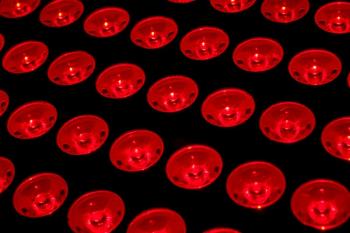
Many AMD supplements do not meet AREDS or AREDS2 standards
A study recently published in Ophthalmology found that nutritional supplements marketed to help treat age-related macular degeneration (AMD) may not be backed by scientific evidence.
San Francisco-A study
According to the study, researchers examined the five top-selling brands of ocular nutritional supplements in the United States according to dollar sales tracked by SymphonyIRI (Waltham, MA) from June 2011 to June 2012. The study reviewed the ingredients and manufacturer claims of 11 ocular nutritional supplements on the companies' consumer information websites. Those ingredients were compared with those contained in the
The researchers determined that some of the top-selling products do not contain identical ingredient dosages to eye vitamin formulas proven effective in clinical trials.
“All of the ocular nutritional supplements contained the ingredients from the AREDS or AREDS2 formula; 36 percent (4/11) of the supplements contained equivalent doses of AREDS or AREDS2 ingredients; 55 percent (6/11) included some information about the AREDS on their consumer information websites,” the study’s authors write.
“Product descriptions from four of the 11 supplements (36 percent) stated that the supplements were important to maintain general eye health; none of these supplements duplicated the AREDS or AREDS2 formula. All the individual supplements claimed to ‘support,’ ‘protect,’ ‘help,’ or ‘promote’ vision and eye health, but none specified that there is no proven benefit in using nutritional supplements for primary prevention of eye disease.”
The study’s authors say their findings emphasize the importance of eyecare professionals educating their patients on the evidence-based role of supplements in the management of eye health. Optometry Times Editorial Advisory Board member Steven Ferrucci, OD, FAAO, agrees.
“This article, in my mind, underscores the importance of patient education regarding vitamin supplements and the eye, specifically
Dr. Ferrucci says that the doctor’s recommendation is key in ensuring the patient is taking the correct supplement for their condition.
“Just like we as optometrists recommend specific contact lenses, contact lens solutions, or progressive lenses, we should be recommending specific nutritional supplements that contain the correct ingredients for the appropriate patients,” he says. “Products that adhere to the AREDS2 formulation are the most appropriate because they have been the most validated by studies, most notably the AREDS2 study that was released last May.”
The study also mentioned that a noted side effect in AREDS was the increase in genitourinary hospitalizations, a known side effect of high dosages of zinc.
“Since AREDS2 found no significant difference in progression to advanced AMD using 80 mg vs. 25 mg of zinc, the practitioner should be aware of this as well when counseling AMD patients about ocular vitamins,” says Optometry Times Editorial Advisory Board member Sherry Bass, OD, FAAO. “There are other formulations available-not studied here-with the AREDS ingredients but with low-dose zinc. “
“Bausch + Lomb fully supports the efforts of researchers and organizations to study the role of vitamins in eye health and to help clarify their benefits for clinicians and patients,” says Kristy Marks, manager, product public relations at Bausch + Lomb.
Marks noted that three of the four supplements that were found to have the same ingredients in the same concentration as those used in the AREDS and AREDS2 studies were Bausch + Lomb products- PreserVision Eye Vitamin AREDS Formula Tablets, PreserVision Eye Vitamin AREDS Formula Soft Gels, and PreserVision AREDS2 Formula.
Donna Lorenson, spokesperson for Alcon said the company is evaluating the results from the study. Alcon’s ICaps AREDS Formula supplement represented the fourth supplement that had the same ingredients in the same concentrations as AREDS and AREDS2.
“As stated in this study, there are currently no regulations for the vitamin industry,” says Dr. Bass. “Regulation may be needed, not only to prevent wasteful spending, but more importantly, to reduce the risk of side effects from the unnecessarily high dosages of some ingredients.”
Unproven is not disproven
Commentary from Dr. Stuart Richer
This meticulously written, but narrowly focused article concerns ocular nutritional supplements for the primary prevention of eye disease. While there’s a dearth of long-term multi-year studies on the efficacy of nutritional supplements on progression of early AMD, there are several international placebo controlled, double-masked, randomized controlled trials evaluating improvement of vision function in these same patients. That is not a trivial issue, as early AMD indeed affects vision, and macular re-pigmentation through dietary carotenoid supplementation (lutein/zeaxanthin) quickly improves night driving visual ability.1,2
Higher-dosed zeaxanthin has also been shown to lengthen the treatment cycle between anti-VEGF injections and other invasive procedures. When 20 mg of dietary zeaxanthin (Z-RR) was added to patients receiving triple therapy for exudative AMD (PDT, dexamethasone, and bevacizumab), the number of treatment cycles required to achieve stabilization with comparable visual acuity results was reduced by approximately 25 percent.3 Nonetheless, the question of supplementation efficacy for an aging population, in terms of disease progression, of keen interest to ophthalmologists, requires further insight and study.
The authors’ conclusions exemplify another failure of the evidence-based medicine scientific model to provide solutions for actual patients concerned about individual chronic medical conditions, including AMD as well as those who do not respond to anti-VEGF injections.4,5 Statistical medicine providing an exact AREDS2 formulation of a few high-dosed nutrients to high-risk AMD patients at best reduces the overall risk of catastrophic visual loss by only one third. Moreover, recent AREDS2 data provide little guidance for the unfortunate AMD patient with geographic atrophy.6
Isn’t it our individual moral imperative as doctors to attempt to save vision with nutrients “not on the list?” This has been accomplished in individual cases with a resveratrol-based supplement at our medical center.7
Unfortunately, the authors draw the conclusion that ophthalmologists need not consider supplementation for chronic eye disease prevention beyond “evidence-based” publications. This conveniently leaves open only the possibility for drug-based treatment(s) and “detect–collect” protocols. What we are really interested in is an AMD prevention diet, along with a wider array of nutrients and environmental measures to shift the discussion to “prevention-cure.”
I applaud manufacturers large and small and private entrepreneurs who are moving beyond the narrow constraints of evidence-based medicine in providing doctors and patients with choices where none now exist. Nutritional supplements in general should be in the mix because they have an excellent safety profile and are certainly more benign than aspirin, whose long-term use increases AMD risk.8,9
In summary, this publication provides little direction and little room for innovation, discretion, and medical judgment.
References
1. Richer S, Park D-W, Epstein R, et al. Macular Re-pigmentation Enhances Driving Vision in Elderly Adult Males with Macular Degeneration. J Clin Exp Ophthalmology. 2012 April.
2. Yao Y, et al. Lutein supplementation improves visual performance in Chinese drivers: 1 -year randomized, double-blind, placebo-controlled study, Nutrition. 2013 Jul-Aug;29 (7-8):958-64.
3. Peralta E, Olk RJ, et al. Oral zeaxanthin improves anatomic and visual outcome of triple therapy for subfoveal CNV in age-related macular degeneration. Retina Society Meeting, poster Sept 21th-25th, 2011, Rome, Italy.
4. Hickey S and Roberts H, Tarnished Gold: The Sickness of Evidence-based Medicine, ISBN 9781466397293, 341 pages.
5. The NNT. Quick summaries of evidence-based medicine. Available at: www.the nnt.com Accessed 01/07/2015.
6. Age-Related Eye Disease Study 2 (AREDS2) Research Group, Chew EY, Clemons TE, Sangiovanni JP, Danis RP, Ferris FL 3rd et al, Secondary analyses of the effects of lutein/zeaxanthin on age-related macular degeneration progression: AREDS2 report No. 3. JAMA Ophthalmol. 2014 Feb;132(2):142-9.
7. Richer S, Stiles W, Ulanski L, Carroll D, Podella C, Observation of human retinal remodeling in octogenarians with a resveratrol based nutritional supplement. Nutrients. 2013 Jun 4;5(6):1989-2005.
8. Mowry JB, Spyker DA, Cantilena LR Jr, et al. 2012 Annual Report of the American Association of Poison Control Centers' National Poison Data System (NPDS): 30th Annual Report. Clin Toxicol(Phila). 2013 Dec;51(10):949-1229.
9. Li L, Li W, Chen CZ, et al.
.
Newsletter
Want more insights like this? Subscribe to Optometry Times and get clinical pearls and practice tips delivered straight to your inbox.




























